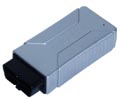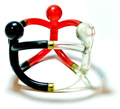Spark Plug

Spark Plug Types

Spark Plug Instalation
1. Spark Plug Basic
The spark plug has two primary functions:(1) To ignite the air/fuel mixture.
(2) To remove heat from the combustion chamber.
Spark plugs transmit electrical energy that turns fuel into working energy. A sufficient amount of voltage must be supplied by the ignition system to cause it to spark across the gap of the spark plug. This is called "Electrical Performance".
The temperature of the firing end of the spark plug must be kept low enough to prevent pre-ignition, but high enough to prevent fouling. This is called "Thermal Performance", and is determined by the heat range selected.
It is important to remember that spark plugs do not create heat, they can only emit heat. The spark plug works as a heat exchanger by pulling unwanted thermal energy away from the combustion chamber, and transferring the heat to the cooling system of the engine. The heat range is defined as the ability of a spark plug to dissipate heat.
The rate of heat transfer is determined by:
(1) The insulator nose length.
(2) Gas volume around the insulator nose.
(3) The materials/construction of the center electrode and porcelain insulator.
The heat range of a spark plug has no relationship to the actual voltage transferred though the spark plug. Rather, the heat range is a measure of the ability of the spark plug to remove heat from the combustion chamber. The heat range measurement is determined by several factors; the length of the ceramic center insulator nose and its ability to absorb and transfer combustion heat, the material composition of the insulator and center electrode material.
1) Heat rating and heat flow path of Spark Plugs
The insulator nose length is the distance from the firing tip of the insulator to the point where insulator meets the metal shell. Since the insulator tip is the hottest part of the spark plug, the tip temperature is a primary factor in pre-ignition and fouling. Whether the spark plugs are fitted in a lawnmower, boat, or a race car, the spark plug tip temperature must remain between 500C~850 Degree C. If the tip temperature is lower than 500 Degree C, the insulator area surrounding the center electrode will not be hot enough to burn off carbon and combustion chamber deposits. These accumulated deposits can result in spark plug fouling leading to misfire. If the tip temperature is higher than 850 Degree C the spark plug will overheat which may cause the ceramic around the center electrode to blister and the electrodes to melt. This may lead to pre-ignition/detonation and expensive engine damage. In identical spark plug types, the difference from one heat range to the next is the ability to remove approximately 70 Degree C to 100 Degree C from the combustion chamber. A projected style spark plug firing tip temperature is increased by 10 Degree C to 20 Degree C.
2) Tip Temperature and Firing End Appearance
The firing end appearance also depends on the spark plug tip temperature. There are three basic diagnostic criteria for spark plugs: good, fouled and overheated. The borderline between the fouling and optimum operating regions (500&def; C) is called the spark plug self-cleaning temperature. The temperature at this point is where the accumulated carbon and combustion deposits are burned off.
Bearing in mind that the insulator nose length is a determining factor in the heat range of a spark plug, the longer the insulator nose, the less heat is absorbed, and the further the heat must travel into the cylinder head water journals. This means the plug has a higher internal temperature, and is said to be a hot plug. A hot spark plug maintains a higher internal operating temperature to burn off oil and carbon deposits, and has no relationship to spark quality or intensity.
Conversely, a cold spark plug has a shorter insulator nose and absorbs more combustion chamber heat. This heat travels a shorter distance, and allows the plug to operate at a lower internal temperature. A colder heat range is necessary when the engine is modified for performance, subjected to heavy loads, or is run at high rpm for a significant period of time. The colder type removes heat more quickly, and will reduce the chance of pre-ignition/detonation and melting or damage to the firing end. (Engine temperature can affect the operating temperature of the spark plug, but not the spark plugs heat range). Below is a list of some of the possible external influences on the operating temperatures of the spark plug. The following symptoms or conditions may have an effect on the actual temperature of the spark plug. The spark plug cannot create these conditions, but it must be able to cope with the levels of heat, if not, the performance will suffer and engine damage can occur.
3) Air/Fuel Mixtures seriously affect engine performance and spark plug operating temperatures.
(1) Rich air/fuel mixtures cause tip temperature to drop, causing fouling and poor drivability. (2) Lean air/fuel mixtures cause plug tip and cylinder temperature to increase, resulting in pre-ignition, detonation, and possibly serious spark plug and engine damage. (3) It is important to read spark plugs many times during the tuning process to achieve the optimum air/ fuel mixture.
4) Higher Compression Ratios/Forced Induction will elevate spark plug tip and in-cylinder temperatures.
(1) Compression can be increased by performing any one of the following modifications:
- Reducing combustion chamber volume (i.e.: domed pistons, smaller chamber heads, milling heads, etc.)
- Adding forced induction (Nitrous, Turbo-charging or Supercharging).
- Camshaft change.
5) Advancing Ignition Timing:
Advancing ignition timing by 10 Degree causes tip temperature to increase by approx. 70 Degree C to 100 Degree C.
6) Engine Speed and Load:
Increases in firing-end temperature are proportional to engine speed and load. When traveling at a consistent high rate of speed, or carrying/pushing very heavy loads, a colder heat range spark plug should be installed.
7) Ambient Air Temperature:
(1) As air temperature falls, air density/air volume becomes greater, resulting in leaner air/fuel mixtures.
(2) This creates higher cylinder pressures/temperatures and causes an increase in the temperature of the tip of the spark plug. So, fuel delivery should be increased.
(3) As temperature increases, air density decreases, as does intake volume, and fuel delivery should be decreased.
8) Humidity:
(1) As humidity increases, air intake volume decreases.
(2) Result is lower combustion pressures and temperatures, causing a decrease in temperature of the spark plug and a reduction in available power.
(3) Air/fuel mixture should be leaner, depending upon ambient temperature.
9) Barometric Pressure/Altitude:
(1) Also affects temperature of the tip of the spark plug.
(2) The higher the altitude, the lower cylinder pressure becomes. As the cylinder temperature decreases, so does the temperature of the tip of the spark plug.
(3) Many mechanics attempt to "chase" tuning by changing spark plug heat ranges.
(4) The real answer is to adjust jetting or air/fuel mixtures in an effort to put more air back into the engine.
2. Types of Abnormal Combustion
1) Pre-ignition:(1) Defined as: ignition of the air/fuel mixture before the pre-set ignition timing mark.
(2) Caused by hot spots in the combustion chamber can be caused (or amplified) by over advanced timing, too hot a spark plug, low octane fuel, lean air/fuel mixture, too high compression, or insufficient engine cooling.
(3) A change to a higher octane fuel, a colder plug, richer fuel mixture, or lower compression may be in order.
(4) You may also need to retard ignition timing, and check cooling system of the vehicle.
(5) Pre-ignition usually leads to detonation; pre-ignition and detonation are two separate events.
2) Detonation:
(1) The worst enemy of the spark plug! (Besides fouling)
(2) Can break insulators or break off ground electrodes.
(3) Pre-ignition most often leads to detonation.
(4) Plug tip temperatures can spike to over 3000 Degree F during the combustion process (in a racing engine).
(5) Most frequently caused by hot spots in the combustion chamber. Hot spots will allow the air/fuel mixture to pre-ignite. As the piston is being forced upward by mechanical action of the connecting rod, the pre-ignited explosion will try to force the piston downward. If the piston can not go up (because of the force of the premature explosion) and it can not go down (because of the upward motion of the connecting rod), and the piston will rattle from side to side. The resulting shock wave causes an audible pinging sound. This is detonation.
(6) Most of the damage than an engine sustains when "detonating" is from excessive heat.
(7) The spark plug is damaged by both the elevated temperatures and the accompanying shock wave, or concussion.
3) Misfires:
(1) A spark plug is said to have misfired when enough voltage has not been delivered to light off all fuel present in the combustion chamber at the proper moment of the power stroke (a few degrees before top dead center).
(2) A spark plug can deliver a weak spark (or no spark at all) for a variety of reasons, defective coil, too much compression with incorrect, plug gap, dry fouled or wet fouled spark plugs, insufficient ignition timing, etc.
(3) Slight misfires can cause a loss of performance for obvious reasons (if fuel is not lit, no energy is being created).
(4) Severe misfires will cause poor fuel economy, poor drive ability, and can lead to engine damage.
4) Fouling:
(1) Will occur when spark plug tip temperature is insufficient to burn off carbon, fuel, oil or other deposits.
(2) Will cause spark to leach to metal shell...no spark across plug gap will cause a misfire. (3) Wet-fouled spark plugs must be changed...spark plugs will not fire.
(4) Dry-fouled spark plugs can sometimes be cleaned by bringing engine up to operating temperature.
(5) Before changing fouled spark plugs, be sure to eliminate root cause of fouling.
5) How to read Spark Plug:
Ex) BPR5EY
- B: Bolt diameter (14mm).
- R: Resistor spark plug (Using 5KOhms ceramic resistor),
- 5: Heat range.
- E: Bolt length (19mm).
- Y: tip type. (V-Power plug)
Resistance spark plug
The spark plug named (xxRxxxx) has ceramic resistance to reduce noise from ignition system.
6) Installation:
(1) Tighten the spark plug with hand by when the gasket (washer) is contact to cylinder block.
(2) In case of brand new spark plug, turn 180 Degree more.
(3) In case of used spark plug, turn 30 Degree more.
(4) If torque wrench is used, keep the tightening torque (2.5~3.0kg-m).
You can check the actuator actual value and status and activate it when it is possible by AutoHex automotive Diagnostic Scanner under the supported car brand and according to engine type.
BMW Key Programming
Description
Spark plugs transmit electrical energy that turns fuel into working energy. A sufficient amount of voltage must be supplied by the ignition system to cause it to spark across the gap of the spark plug. This is called Electrical Performance.
Autohex II Reviews
AutoHex II
AutoHex II is your best choice to have full access to dealer functions like coding, adjusting and modules flashing/programming, Contact us for prices
AutoHex Forum
In AutoHex onboard diagnostic forum you will find discussions how to change the configurations of the car by the professional special functions using AutoHex scan tool
Diagnosis and Coding



